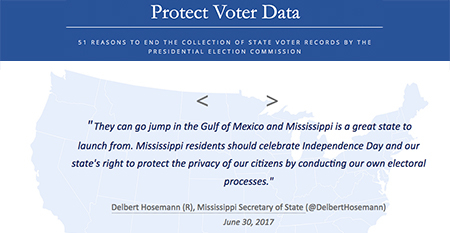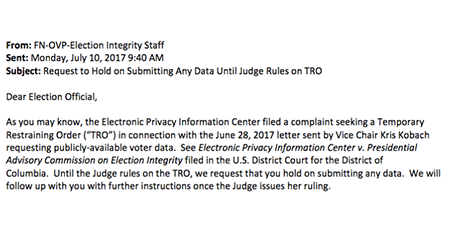EPIC has sent a statement to the House Homeland Security Committee in advance of a hearing on "Technology's Role on Securing the Border." EPIC alerted the Committee to EPIC's recent FOIA lawsuit about the federal government's deployment of a biometric "entry/exit tracking system," including at US airports. A recent Executive Order on immigration will push forward the biometric identification system, and will include citizens returning to the U.S. EPIC has warned that biometric identification techniques, such as facial recognition, lack proper privacy safeguards. EPIC noted that the federal agency pursuing the border identification program is also deploying drones, and should comply with state laws and a 2015 Presidential Memorandum that limit drone surveillance.
A federal district court in Washington, DC has denied EPIC’s motion for an injunction against the Presidential Election Commission and declined to block the Commission’s nationwide collection of voter data. As EPIC told the court last week, the Commission failed to undertake and publish a Privacy Impact Assessment before collecting voter data and violated the constitutional right to information privacy. The court agreed that EPIC had “standing” to bring the case because the Commission had “an obligation to disclose information” and because the Commission’s actions “required [EPIC] to expend resources” in order to obtain a Privacy Impact Assessment. But the court concluded that it could not halt the Commission’s plan to aggregate millions of voter records because the Commission is exempt from statutes that govern the conduct of federal “agencies.” The court noted, however, that “this determination may need to be revisited” at a later time. The court also warned the Commission must “strictly abide” by promises to only collect information that is “already publicly available” and to “de-identif[y]” voter data “to the extent it is made public.” EPIC intends to press forward with the lawsuit, which led the Commission to suspend the collection of voter data two weeks ago. The case is EPIC v. Commission, No. 17-1320 (D.D.C. filed July 3, 2017). [Press Release]
The Texas NAACP and the League of Women Voters of Texas have filed suit against state election officials to prevent the transfer of personal voter data to the Presidential Election Commission. "The information sought by the Commission is not widely available in Texas, but instead may be released only under certain circumstances and conditions imposed by Texas's voting laws," the complaint reads. The suit notes that the state's disclosure of election records to the Commission, "even if cabined to information generally available to candidates or other organizations who are entitled to request voter information under Texas law, would undermine, and run afoul of, the State's carefully-crafted regulation of the use of voter data." The Texas case joins at least two other lawsuits—one in Florida and one in New Hampshire—seeking to block state officials from providing voter data to the Election Commission. In Washington DC, EPIC has filed suit against the Commission and is urging a federal court to issue a preliminary injunction. The Commission suspended the collection of personal voter data last week in response to EPIC's lawsuit. The Court is expected to rule on EPIC's motion shortly. The case is EPIC v. Commission, No. 17-1320 (D.D.C. filed July 3, 2017).






















